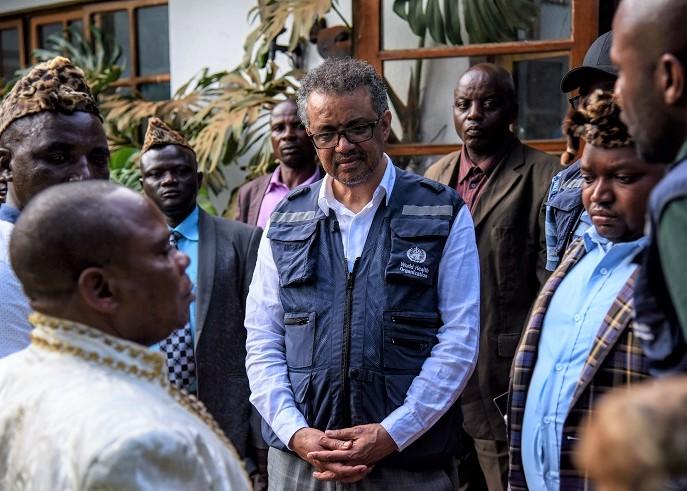In the wake of violent attacks in Butembo in the Democratic Republic of the Congo (DRC) that killed a World Health Organization (WHO) responder, two top WHO officials today wrapped up a visit to the city, as the surge of cases continued in the outbreak, with 14 new cases reported.
Also today, African countries near the DRC met in Kampala today to review their Ebola preparedness steps and form new plans for preventing and responding to the possible arrival of the virus within their borders.
High-level visit airs profound worry
The visit from WHO Director-General Tedros Adhanom Ghebreyesus, PhD, and WHO Regional Director for Africa Matshidiso Moeti, MD, comes just 10 days after WHO epidemiologist Dr Richard Mouzoko was killed in an armed attack during his work on the Ebola outbreak.
In a statement, the two said they were profoundly worried about the situation and acknowledged that recent surges in infections are the result of setbacks each time the response sustains violent attacks.
Most of the response activities—such as community engagement, vaccination, and case investigation—have restarted following a slowdown after the attacks that killed Mouzoko and injured two others, the WHO said. It notes, however, that the torrent of cases in recent weeks is further straining resources.
Moeti said her pride and respect for the outbreak responders has grown. "They have been through something unimaginable and yet are willing to continue this vital work. We need the security situation to be under control for them and for the local people."
The group met with Butembo's mayor, US Ambassador Michael Hammer, a United Nations (UN) peacekeeping mission (MONUSCO) representative, and other partners, as well as local business, religious, and political leaders.
WHO officials also urged the international community to step up its support to contain the outbreak, including bridging funding gaps. Tedros said the response requires major shifts. "WHO and partners cannot tackle these challenges without the international community stepping in to fill the sizeable funding gap." He added that the WHO has received only half of the support it asked for, which could require health officials to scale back activities when they are needed most.
New cases boost total to 1,480
Meanwhile, in outbreak developments, the DRC health ministry reported 14 more cases today, including 6 in Katwa, 2 in Musienene, and 2 in Butembo. Also, four other locations each reported a single case: Mabalako, Beni, Kayna, and Kalunguta.
The newly confirmed cases lift the outbreak total to 1,480 cases, which includes 1,414 confirmed and 66 probable infections. Health officials are still investigating 279 suspected cases.
Thirteen more people died from Ebola, six in community or hospital settings across a broad swath of the current hot spots: Katwa, Musienene, Kayna, and Beni. Seven others died at Ebola treatment centers, including four in Butembo and three in Katwa. Total outbreak deaths have now climbed to 970.
In other outbreak developments, the ministry said that—based on a recent request from the DRC's president—the country's prime minister and Health Minister Oly Ilunga Kalenga, MD, today signed a decree establishing and organizating a multisector committee for Ebola response. The committee's goal is to spell out new government steps to battle the outbreak, coordinate with different government levels, and help allocate resources for the response. It will meet weekly or more often, as needed.
Regional officials meet in Kampala
Also today, international partners working on Ebola preparedness and response began a 2-day meeting in Kampala, Uganda's capital, to discuss key risk factors and response challenges and to suggest new solutions.
In a press release from the WHO's Uganda office, Jane Ruth Aceng, MBChB, MPH, the country's health minister, said the increasing complexity of the outbreak in the two DRC provinces poses a risk of spread within the DRC and to its neighbors. "This outbreak is therefore not a problem of the DRC alone," she said.
Comprising delegates from nine countries, the group is slated to share information on their Ebola preparedness strategies and share information on their challenges and best practices. At the end of the meeting, the group will develop a joint preparedness roadmap.
Among the experts' worries are infection prevention and control in health facilities and deaths that keep occurring in community settings, the WHO said.
However, the biggest concern is the fragile security situation in the DRC's affected areas. Presenters from the DRC said there are about 30 armed groups in the outbreak region, some of which have attacked Ebola treatment centers.
Officials said the DRC's neighbors have reason to worry, given long porous borders and frequent population movements.
See also:
Apr 30 WHO statement
Apr 30 DRC update
Apr 30 WHO African regional office statement



















